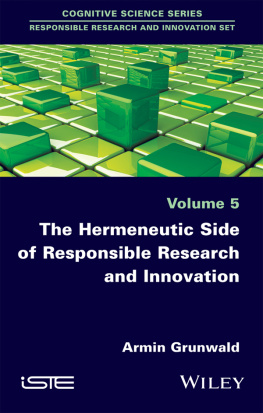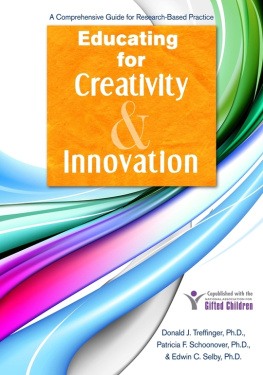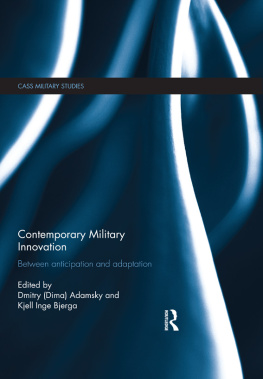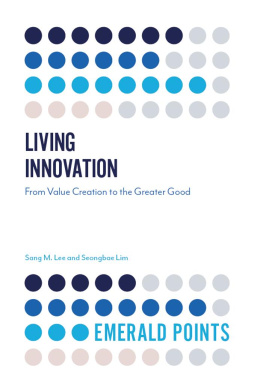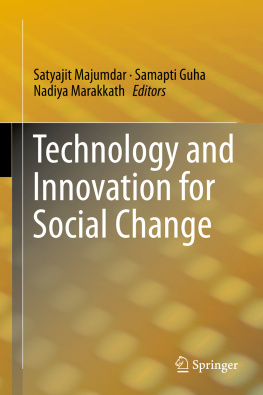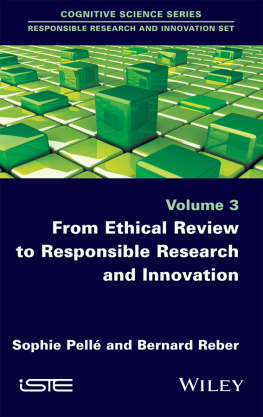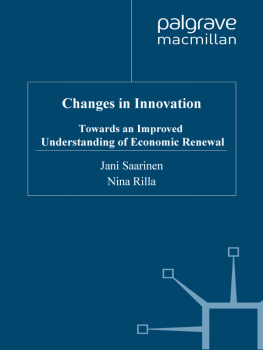
Responsible Research and Innovation Set
coordinated by Bernard Reber
Volume 5
The Hermeneutic Side of Responsible Research and Innovation
Armin Grunwald
First published 2016 in Great Britain and the United States by ISTE Ltd and John Wiley & Sons, Inc.
Apart from any fair dealing for the purposes of research or private study, or criticism or review, as permitted under the Copyright, Designs and Patents Act 1988, this publication may only be reproduced, stored or transmitted, in any form or by any means, with the prior permission in writing of the publishers, or in the case of reprographic reproduction in accordance with the terms and licenses issued by the CLA. Enquiries concerning reproduction outside these terms should be sent to the publishers at the undermentioned address:
ISTE Ltd
27-37 St Georges Road
London SW19 4EU
UK
www.iste.co.uk
John Wiley & Sons, Inc.
111 River Street
Hoboken, NJ 07030
USA
www.wiley.com
ISTE Ltd 2016
The rights of Armin Grunwald to be identified as the author of this work have been asserted by him in accordance with the Copyright, Designs and Patents Act 1988.
Library of Congress Control Number: 2016954166
British Library Cataloguing-in-Publication Data
A CIP record for this book is available from the British Library
ISBN 978-1-78630-085-0
Foreword
The author of this book has three precious skills to offer in the understanding and implementation of responsible research and innovation (RRI). He has been trained in physics, he is a philosopher and an important practitioner in the field of technological assessment (TA) and its inclusive form of participatory technological assessment (PTA). For this last reason, this book is very welcome to extend the content of the previous volume (Volume 4) in this set of books, Precautionary Principle, Moral Pluralism and Deliberation. Sciences and Ethics. Some of the problems addressed in both texts, practically and theoretically, are common to both the PTA and RRI fields. Armin Grunwald thinks that there is quite nothing new with RRI compared to PTA. In this way he replaces the novelty of RRI in a 30-year tradition, mainly developed in Europe, at least with public institutions, when these experiments are operated mainly by the private sector or universities out of this area.
As a physicist in charge of one of the biggest TA and PTA institutions, he could have insisted on the different ways to calculate the different risks of emerging technologies. Instead of calculation he appeals to forms of discourse. Indeed, before emerging in research programs, new technologies are produced in different narratives. What is a new trend in political discourses, tell us a story for this project, from a small program up to a European building, is true in innovation and research as well. As he writes, this book is to decipher the meaning assigned to new and emerging science and technology (NEST). When the so-called post-modern philosophies have preached their end, the big stories come back just like a boomerang. This need of a story is perhaps because of the fragmentation of knowledge necessary for developing the new technologies and in a second step their socio-political impacts on societies. The place of technologies in the globalization process is central. There would be no globalization without technologies, they are in transportation, information or communication and human biology. The RRI pillar pleading for open science is only a partial solution to the problem of the fragmentation of knowledge. As a medicine the pharmakon, remedy, poison and scapegoat in Phaedrus exploited by the French philosopher Jacques Derrida it can heal, but at the same time it can make the problem worse.
The action of assigning meaning, central to this book, is very close to the core of responsibility. One of the meanings of responsibility is imputation as presented in Volume 3 of this set by Sophie Pell and Bernard Reber (From Ethical Review to Responsible Research and Innovation). Indeed, the meaning thus stands just as, for example, that of responsibility () in a social and communicative context in which arguments for attributions are expected but can also be controversial.
Armin Grunwald conveys here another philosophical tradition: the hermeneutic one. From the theological field dealing with the study of texts, to Heidegger, Gadamer, Ricoeur, this prolific sub-field of philosophy is specialized on the problem of interpretation. While the previous volume (Volume 4) was mainly focused on argumentation, this volume largely opens the space to interpretation. The problem of narrative is an uncharted territory in RRI debates. The field of new and emerging science and technology does not focus on those technologies as such. A breakthrough technical or scientific success does not have any societal meaning per se. Therefore, it is important to see how these meanings are created and disseminated. Attribution of responsibilities to new technology takes place at a very early stage of development. The assignment of meaning may even be decisive for social acceptance or rejection of technology.
Where Ricoeur was more interested in the identity problem, with five determinations of the human capacities language, action, narration, ethics (responsibility) and memory Armin Grunwald in his three forms of hermeneutics has introduced actions mediated by technologies, when some are sophisticated, and turned into the future.
This text echoes further volumes in three different ways.
Firstly, it deals with uncertain futures as in Volumes 14. The major origins of the production and assignment of meaning is based on techno-visionary futures and approaches to define and characterize new fields of science and technology, as Armin Grunwald has presented in detail, especially in . Indeed, these narratives play a decisive role in determining the nature of what is new. This is also true as an element in the ethical theories (see Volume 4). It follows here more a pragmatic line, meaning something (objects) for someone (addressee).
Secondly, these techno-visionary futures play an important role in what some present as anticipatory governance. Volume 4 of the set insisted more on the famous precautionary principle. We have here a contribution in the debate between anticipation and precaution. But traditional approaches based on consequentialist reasoning no longer work. We are facing problems of reliability. If the precautionary principle is used in cases where we have no means to build on reliable probabilities, these visions of the futures could have a role in the assessment.
In the debate regarding anticipatory governance, Grunwald puts more emphasis on the meaning of the projections as expressions of todays diagnoses, perceptions, expectations, attitudes, hopes and fears instead of interpreting them as anticipation. We have another way to speak about the communicational expectations of Habermas, less normative and more focused on the objects than the people taking part in the interactions.
Thirdly, Armin Grunwald recognizes that he is mainly focused of the beginnings of a hermeneutic circle of reaching an understanding on the meaning of NEST developments. However, this initial station of the attribution of meaning is very crucial since it limits the diversity of alternatives. We find here a defence of the diversity of possibles and the recognition of the contested future, already tackled as an important issue between ethics and efficacy (Volume 1).
Next page
